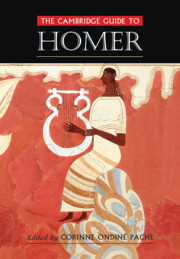Book contents
- The Cambridge Guide to Homer
- The Cambridge Guide to Homer
- Copyright page
- Contents
- Figures
- Notes on the Contributors
- General Introduction
- Part I Homeric Song and Text
- Part II Homeric World
- Part III Homer in the World
- Introduction
- Homer in Antiquity
- Homer and the Latin West in the Middle Ages
- Homer in Greece from the End of Antiquity 1: The Byzantine Reception of Homer and His Export to Other Cultures
- Homer in Greece from the End of Antiquity 2: Homer after Byzantium, from the Early Ottoman Period to the Age of Nationalisms
- Homer in Renaissance Europe (1488‒1649)
- Homer in Early Modern Europe
- The Reception of Homer since 1900
- Homer: Image and Cult
- Key Topics
- Bibliography
- Index
- References
Homer in Greece from the End of Antiquity 2: Homer after Byzantium, from the Early Ottoman Period to the Age of Nationalisms
from Part III - Homer in the World
Published online by Cambridge University Press: 22 February 2020
- The Cambridge Guide to Homer
- The Cambridge Guide to Homer
- Copyright page
- Contents
- Figures
- Notes on the Contributors
- General Introduction
- Part I Homeric Song and Text
- Part II Homeric World
- Part III Homer in the World
- Introduction
- Homer in Antiquity
- Homer and the Latin West in the Middle Ages
- Homer in Greece from the End of Antiquity 1: The Byzantine Reception of Homer and His Export to Other Cultures
- Homer in Greece from the End of Antiquity 2: Homer after Byzantium, from the Early Ottoman Period to the Age of Nationalisms
- Homer in Renaissance Europe (1488‒1649)
- Homer in Early Modern Europe
- The Reception of Homer since 1900
- Homer: Image and Cult
- Key Topics
- Bibliography
- Index
- References
Summary
The Byzantine interpretative framework through which Homeric and Homerizing literature was approached in the Middle Ages survived in the Greek world until its last vestiges were cast away in the early nineteenth century with the creation of an independent Greek state and the establishment of a national educational curriculum modeled after the Bavarian one. The reception of Homer in Greece and the Balkans during the nineteenth century was shaped by the key position of epic poetry in the development of romantic nationalism. Nineteenth-century Greek poets writing about the military struggle for independence from the Ottoman Empire cast prominent figures as successors to the Homeric heroes. This conception of the past generated a desire to translate Homer into Balkan languages and translations of Homer’s epics into Ottoman Turkish, Albanian, Bulgarian, and Serbian were made by non-Greek graduates of Greek schools. Although the translators of Homer in the Balkans and in the Middle East had different motivations, their works collectively indicate a desire to become directly acquainted with literary works considered foundational to Western European modernity.
- Type
- Chapter
- Information
- The Cambridge Guide to Homer , pp. 473 - 489Publisher: Cambridge University PressPrint publication year: 2020

